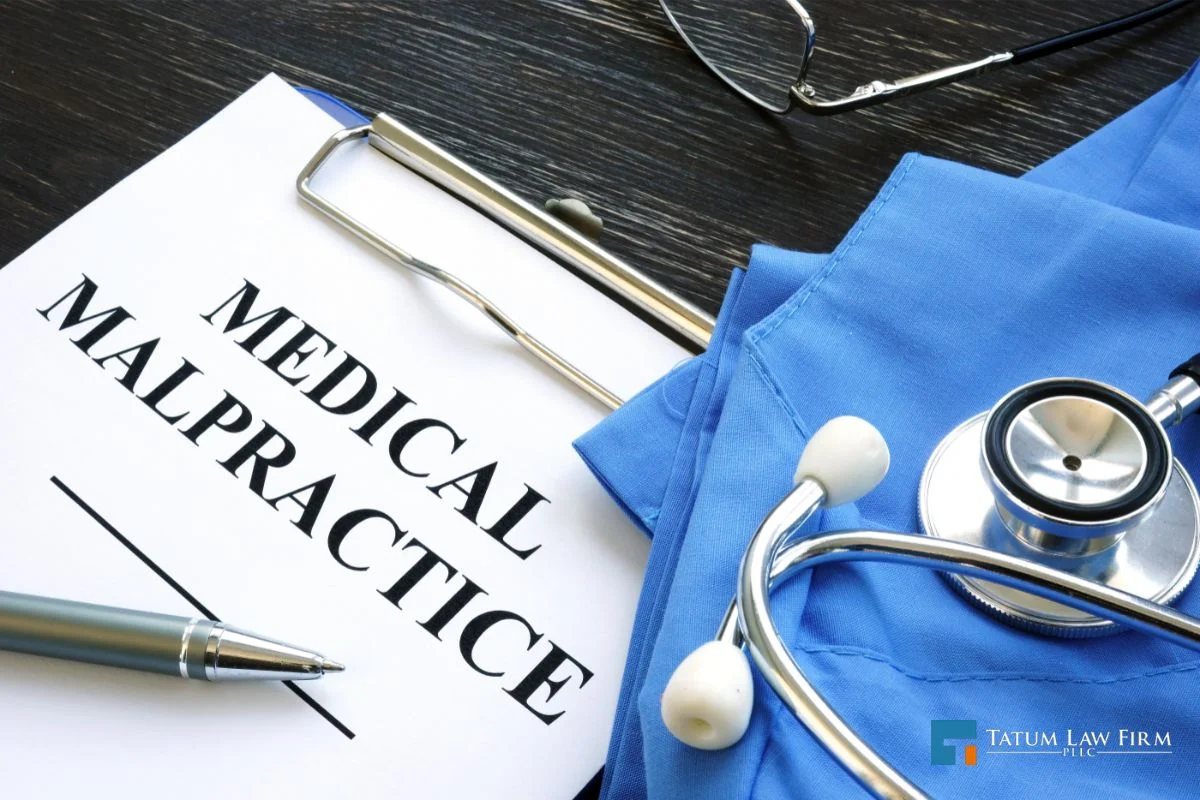Raleigh Medical Malpractice Lawyer

Raleigh Medical Malpractice Attorney
If you sustained an injury, illness, or other adverse effects while receiving medical treatment due to the physician making a mistake, you may have a medical malpractice claim. This can allow you to pursue compensation for your losses. A Raleigh medical malpractice lawyer can assess the details of your situation and determine whether you have a strong claim.
The Tatum Law Firm has handled numerous cases involving a personal injury, including medical malpractice claims. We have helped clients receive compensation after car accidents, slip and falls, harm from defective products, workplace accidents, and more. Our legal team is also equipped to help individuals with legal malpractice claims, eminent domain matters, and commercial litigation.
What Is Medical Malpractice in Injury Law?
As is the case in any profession, doctors, nurses, and other medical professionals can sometimes make mistakes. However, medical mistakes are very serious and have the potential to be detrimental to the patient. Not every instance of physician error is necessarily malpractice; mistakes can sometimes arise even when the doctor is making logical conclusions and following procedures.
Medical malpractice is the explicit negligence or carelessness of a medical professional that directly causes their patient to incur (potentially lifelong) physical damage or even die as a result of an avoidable injury. This can occur because the prescribed treatment was incorrect or the medical professional improperly administered or measured it. Negligent harm could also occur because there was a lack of treatment at all.
Examples of Medical Malpractice
These are just some examples of medical negligence in Raleigh that you may experience and could file an injury claim for. If you’re unsure whether your circumstances constitute medical malpractice, it’s wise to speak with an attorney who is experienced in personal injury law. It is particularly important to find one who has handled numerous medical malpractice cases or claims that are similar to yours.
- Misdiagnosis, delayed diagnosis, or a failure to diagnose. Misdiagnosing a patient’s condition not only prolongs the administering of proper, necessary treatment, but it also has the potential to inflict serious damage. Additionally, if a physician takes too long to diagnose the ailment or never does, the affected person may have lost critical time to address the issue and/or have suffered subsequent problems.
- Improper treatment. If a doctor prescribes a medication or procedure that does not meet the standard of care for a patient’s condition, it can cause their condition to worsen and even lead to further damage. Additionally, if the correct treatment is not properly administered by medical staff, such as through the failure to provide a treatment that is needed every few hours, that is also malpractice.
- Medication or pharmacy errors. In addition to prescribing medication that is not within the standard of care for a specific illness, it is also medical negligence to prescribe or administer too low or too high of a dosage to the patient. This has the potential to cause severe bodily harm in addition to prolonging appropriate treatment. It also constitutes malpractice if a pharmacist improperly fills a prescription, whether by dosage or substance.
- Surgical and anesthetic mistakes. There are several instances in which a surgical error may occur. One example is a surgeon who damages the surrounding organs that are unrelated to the procedure that they are conducting. If there are mistakes while administering anesthesia to the patient, there may be significant, even fatal, consequences.
- Childbirth injuries. There are various errors that can occur during childbirth, and these may lead to the baby or mother sustaining an injury or even permanent damage. An example is delaying delivery or not performing a C-section when the circumstances otherwise warrant it.
Proving Liability for Medical Malpractice Claims
For a physician’s mistake to be considered malpractice, it must be sufficiently proven that the treatment, or lack thereof, was a result of their negligence.
Standard of Care
A standard of care exists for all common conditions. Your personal injury attorney must establish that the physician owed you this standard of care for the affliction that you were seeking medical attention for, including appropriate testing, diagnosis, treatment, medication, ongoing care, etc. Within their standard of care, it’s expected that the doctor would take similar measures that other reasonable medical personnel would take if they were to treat the same ailment.
The Medical Professional Breached the Standard
The next step in proving negligence is providing evidence that the physician breached their duty of care by not meeting the standard. This means that the doctor did not administer care as a reasonable peer would have if presented with the same situation and information.
It is important to prove this component because a reason may be discovered later for why the chosen treatment was insufficient or incorrect (e.g., relevant but undisclosed family medical history). However, if the doctor’s care normally would be considered acceptable for the patient’s condition or symptoms, it is not considered negligent.
The Breach Resulted in Your Damages
Lastly, your lawyer would need to prove that it was the physician’s breach of care that directly caused the injury. If there was a failure to provide the standard of care but no adverse effects appeared, then there is no valid claim for malpractice. Evidence must show that the doctor’s breach is what led to the patient’s worsening or persisting condition or a newly acquired issue.
What Damages Can Be Recovered After Medical Negligence?
Damages refer to the financial compensation that a victim of medical malpractice receives for their injuries, distress, and out-of-pocket costs. The settlement award is usually the sum of both the injured party’s economic and non-economic damages. Rarely, the victim will additionally be awarded punitive damages, which are meant to further punish and deter the offending party from future negligence. Punitive damages are reserved for especially malicious or heinous negligence.
Economic losses include the victim’s lost wages or ability to earn future income as a result of their injuries. It also includes time spent recovering, any damage to personal property, and all medical expenses. Damages can be recovered for past (and future) medical care and treatment, including:
- ER visits
- Hospital stays
- Doctor’s appointments
- Surgeries and other procedures
- Lab tests
- Medication
- Rehabilitation and physical therapy
- Mental health counseling
Non-economic damages include the injured victim’s:
- Physical pain
- Permanent disfigurement (e.g., amputations, scarring)
- Emotional suffering and mental anguish
- Psychological trauma
- Newly acquired long-term or permanent conditions, such as epilepsy or seizures
- Incurred cognitive disabilities
- Loss of enjoyment of life
- Inability to self-support
- Impacts on personal relationships
The current cap on medical malpractice non-economic damages is $656,730.
FAQs
Q: What Qualifies as Medical Malpractice in NC?
A: A medical error is considered malpractice when it’s proven that the physician was acting negligently. To prove negligence and thus liability, the patient’s attorney must present evidence that there’s a standard of care for your condition (meaning that it wasn’t a very rare illness).
The lawyer must proceed to prove that the medical professional breached this standard of care, which a reasonable colleague would administer for the same circumstances, and that this breach directly resulted in physical injury to the plaintiff.
Q: Is There a Cap on Medical Malpractice in North Carolina?
A: In North Carolina, there is only a cap for non-economic damages in a medical malpractice settlement. Currently, injured individuals are only able to recover up to $656,730 for pain and suffering damages. This cap is required to be reset every three years and has steadily increased since the mandate was installed in 2014. There is no cap on economic damages, which includes medical expenses and loss of income.
Q: Do I Need a Lawyer for a Medical Malpractice Claim?
A: There are no laws requiring you to hire an attorney for any personal injury claim, including medical malpractice cases. However, it is strongly advised for you to consider consulting with a qualified personal injury lawyer if you want to file a claim. An experienced legal professional is a valuable resource; they can help you find strong evidence and ensure that your legal rights are protected. They can also make sure that you are not taken advantage of due to your limited knowledge of the law.
Q: What Is the Statute of Limitations for Medical Negligence in NC?
A: The statute of limitations in North Carolina for personal injury claims is three years from the date when you received medical care. If there was a delayed discovery of an injury, the statute of limitations then becomes one year from the date of discovery. It’s important to consult with a medical malpractice attorney as soon as you can following the instance of negligent care. That way, there can be ample time to investigate and build a strong case for your claim.
Q: What Is an Example of Malpractice?
A: An example of medical malpractice is if an individual’s doctor prescribed improper treatment for their condition. It would be malpractice if a person sought medical attention for their symptoms and the doctor incorrectly diagnosed their condition as a mere fever, prescribing treatment to alleviate a fever.
When the patient’s symptoms don’t improve, they go to a different doctor and find out they instead have an infection that led to sepsis due to untimely proper treatment.
Receive the Fair Compensation That You’re Entitled To
The professional team at the Tatum Law Firm is here to help you seek a settlement for the unnecessary harm that you suffered. Experiencing medical negligence can be very frightening, and it can be intimidating to fight back against a medical professional. Consult with an attorney who can be there to guide you and represent your rights throughout the entire process.






